Lenovo ThinkPad P72 Performance Testing
Over time benchmark versions have changed a great deal and we have added additional benchmarks to our workstation reviews. We have scripted our benchmarks and will add them all here. At this time we only have a few benchmarks that translate to previous reviews, and we will show those, newly updated benchmarks might just show one result at this time, we will add in results for newer reviews as we go.
CrystalDiskMark Storage Testing
CrystalDiskMark is a well-known benchmark to test your HDD or SSD’s.
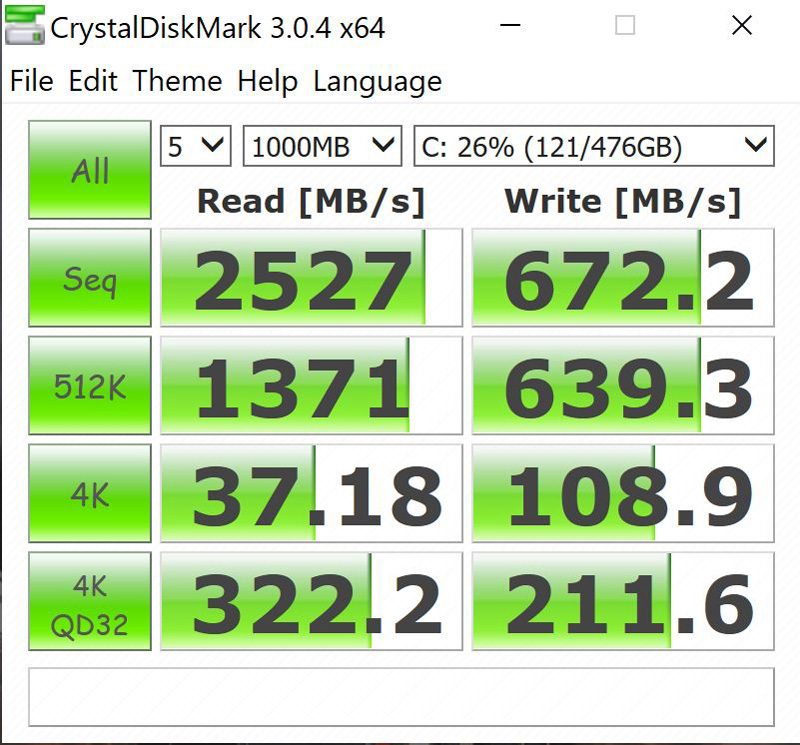
The Union Memory NVMe M.2 80mm 512GB SSD gives excellent results and provides fast boot times.
Let us move on and start our testing with computing-related benchmarks.
AIDA64 Memory Test
AIDA64 memory bandwidth benchmarks (Memory Read, Memory Write, and Memory Copy) measure the maximum achievable memory data transfer bandwidth.
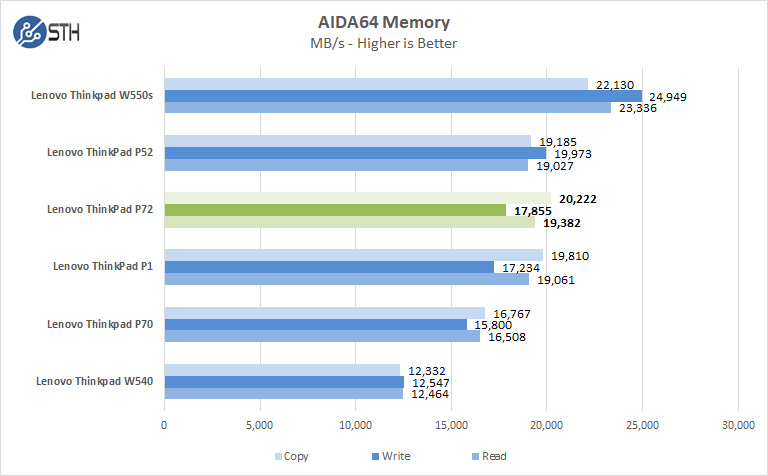
Our ThinkPad P72 has only one stick of memory installed, Installing additional memory sticks in the ThinkPad P72 would provide us with higher results that we see here.
AIDA64 GPGPU
These benchmarks are designed to measure GPGPU computing performance via different OpenCL workloads.
- Single-Precision FLOPS: Measures the classic MAD (Multiply-Addition) performance of the GPU, otherwise known as FLOPS (Floating-Point Operations Per Second), with single-precision (32-bit, “float”) floating-point data.
- Double-Precision FLOPS: Measures the classic MAD (Multiply-Addition) performance of the GPU, otherwise known as FLOPS (Floating-Point Operations Per Second), with double-precision (64-bit, “double”) floating-point data.
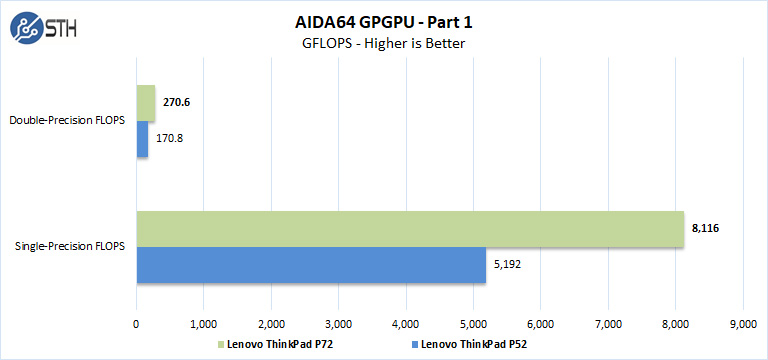
Here we can see the advantage the Intel Xeon E-2186M has with six cores and the Quadro P5200 has over the Intel Core i7 8850H and Quadro P3200 in our ThinkPad P52 review.
The next set of benchmarks from AIDA64 are:
- 24-bit Integer IOPS: Measures the classic MAD (Multiply-Addition) performance of the GPU, otherwise known as IOPS (Integer Operations Per Second), with 24-bit integer (“int24”) data. This particular data type defined in OpenCL on the basis that many GPUs are capable of executing int24 operations via their floating-point units.
- 32-bit Integer IOPS: Measures the classic MAD (Multiply-Addition) performance of the GPU, otherwise known as IOPS (Integer Operations Per Second), with 32-bit integer (“int”) data.
- 64-bit Integer IOPS: Measures the classic MAD (Multiply-Addition) performance of the GPU, otherwise known as IOPS (Integer Operations Per Second), with 64-bit integer (“long”) data. Most GPUs do not have dedicated execution resources for 64-bit integer operations, so instead, they emulate the 64-bit integer operations via existing 32-bit integer execution units.
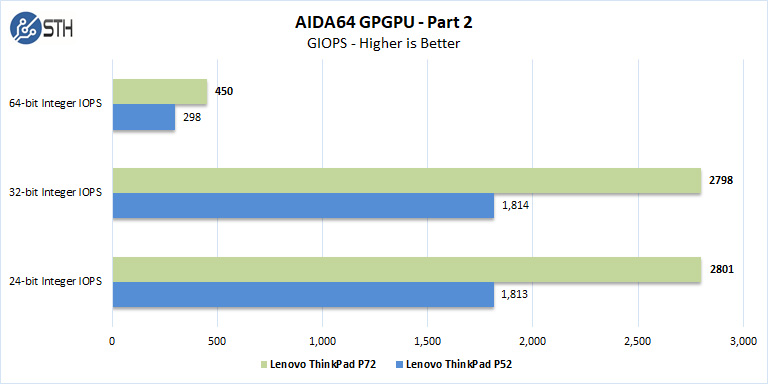
The NVIDIA Quadro P5200 translates to approximately NVIDIA GeForce GTX 1080 performance levels if comparing to a desktop part. One can see the massive upgrade in performance for moving to the Quadro P5200 over the Quadro P3200.
Geekbench 4
Geekbench 4 measures the compute performance of your GPU using image processing to computer vision to number crunching.
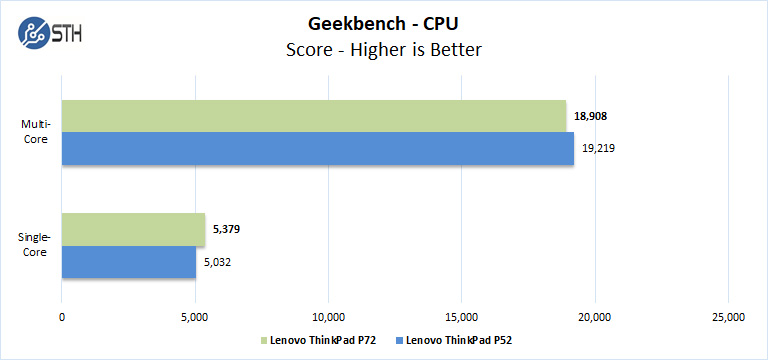
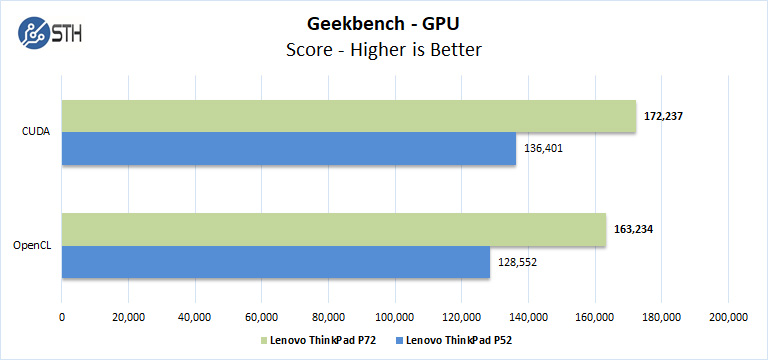
Overall the Lenovo ThinkPad P72 shows solid results; the NVIDIA Quadro P5200 shows strong improvements vs. the ThinkPad P52’s Quadro P3200.
LuxMark
LuxMark is an OpenCL benchmark tool based on LuxRender.
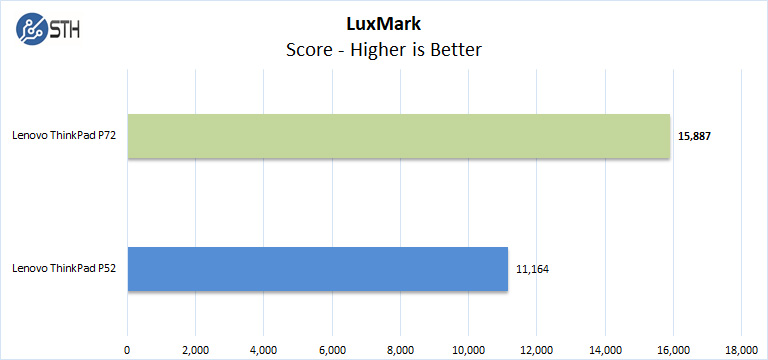
Here we see the impact of moving up to the NVIDIA Quadro P5200 again with a 42% performance gain.
Let us move on and start our testing with graphics-related benchmarks.

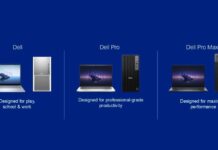
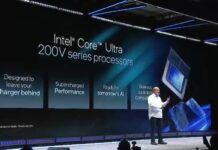
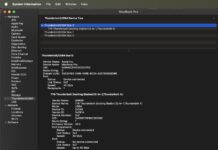
> If you are […] an accountant, or someone pushing IP numbers and inventory numbers all day as an admin, the num pad is a welcome addition.
Absolutely. With accountants and other number pushers being the target customer base for such a mobile a̶c̶c̶o̶u̶n̶t̶i̶n̶g̶workstation, a number pad is a must. Without a number pad, what would an accountant do with such a machine? Excel woudn’t be really usable without a number pad, no?
Where did you fine a P72 with a touchscreen — not on lenovo.com?